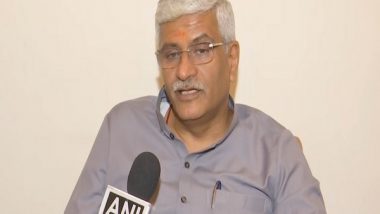New Delhi [India], April 23 (ANI): Terming the Indus Water Treaty as the "purest" treaty in the world, Union Minister Gajendra Shekhawat on Saturday slammed Pakistan for violating it by showing "dual precedence".
Speaking to ANI, Shekhawat said, "After partition, Indus Water Treaty was signed between India and Pakistan regarding the distribution of water. It is the purest treaty, out of all the water treaties in the world. Even after three full-fledged wars, India has kept the sanctity of the treaty which shows India's character".
Also Read | Ajit Pawar Capable of Becoming Maharashtra CM, Says Sanjay Raut.
He slammed Pakistan for showing "dual precedence" and violating the rules of the treaty.
"Recently, Pakistan challenged India's rights and demanded a third party to look into the matter. The World Bank also approved it. But, at the same time, Pakistan had also approached the International Court of Justice. This dual precedence is against the treaty," he said.
The Union Minister added, "India has registered its objection against it at the World Bank. The matter is being discussed, and let's wait for the decision from there for deciding upon the future course of action".
On being asked why Pakistan is making such statements while undergoing an economic crisis, Shekhawat said, "For understanding this, we have to listen to the Pakistan minister's remark. It will show why Pakistan is undergoing crisis, and why is it making such statements.
India issued notice to Pakistan on January 25 for modification of the Indus Waters Treaty (IWT) of September 1960 after Islamabad's actions adversely impinged the provisions of the treaty, according to sources.
The notice was conveyed on January 25 through respective Commissioners for Indus Waters as per Article XII (3) of the IWT.
The objective of the notice for modification, according to sources, is to provide Pakistan with an opportunity to enter into intergovernmental negotiations within 90 days to rectify the material breach of the IWT. This process would also update IWT to incorporate the lessons learned over the last 62 years.
India has always been a responsible partner in implementing the IWT. Pakistan's actions, however, have encroached on the provisions of IWT and their implementation and forced India to issue an appropriate notice for modification of IWT.
In 2015, Pakistan requested the appointment of a Neutral Expert to examine its technical objections to India's Kishenganga and Ratle Hydro Electric Projects (HEPs). In 2016, Pakistan unilaterally retracted this request and proposed that a Court of Arbitration adjudicate its objections.
Pakistan, despite repeated efforts by India to find a mutually agreeable way forward, has refused to discuss the issue during the five meetings of the Permanent Indus Commission from 2017 to 2022. The World Bank at Pakistan's continued insistence initiated actions on both the Neutral Expert and Court of Arbitration processes. Such parallel consideration of the same issues is not covered under any provision of IWT.
The World Bank in October 2022, made appointments in two separate processes requested by India and Pakistan in relation to the Kishenganga and Ratle hydroelectric power plants.
It appointed a chairman of the Court of Arbitration and a neutral expert "in line with its responsibilities" under the Indus Waters Treaty.
A World Bank release said that the two countries disagree over whether the technical design features of the two hydroelectric plants contravene the Treaty.
Michel Lino was appointed as the Neutral Expert and Sean Murphy was appointed as Chairman of the Court of Arbitration. They will carry out their duties in their individual capacity as subject matter experts and independently of any other appointments they may currently hold, the release said. (ANI)
(This is an unedited and auto-generated story from Syndicated News feed, LatestLY Staff may not have modified or edited the content body)













 Quickly
Quickly
















